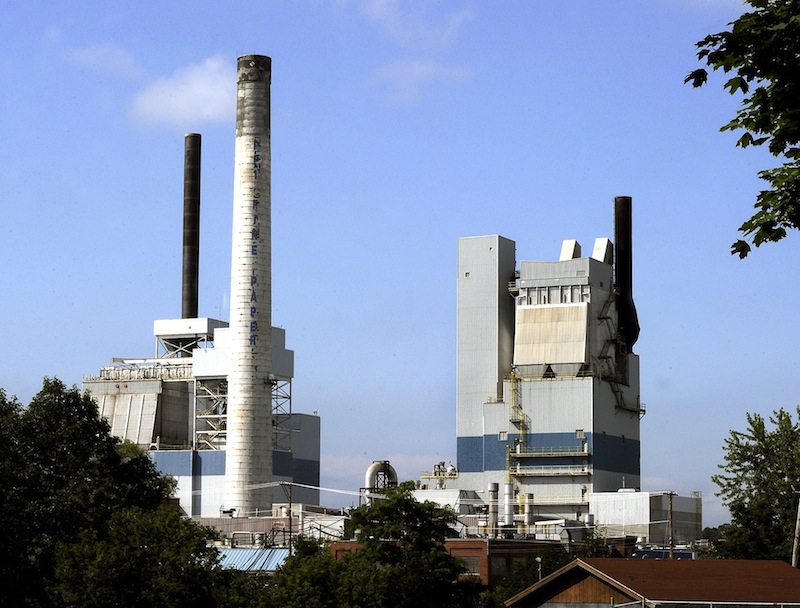Maine’s pulp and paper industry is strongly supporting a proposal by the LePage administration to reduce certain anti-smog regulations affecting new and newly refitted industrial plants.
In a letter Tuesday from its attorney and lobbyist, Dixon Pike of the Portland law firm Pierce Atwood, the Maine Pulp and Paper Association said its members “strongly oppose” the existing rules because they “will not address an environmental problem.”
“This puts Maine mills at a competitive disadvantage when attracting capital investments and selling products with no reasonable environmental justification,” Pike wrote, adding that it’s “a nonsensical result.”
The Department of Environmental Protection is seeking federal approval to change Maine’s air pollution plan under the federal Clean Air Act. Critics say the change would undermine a 13-state agreement that has been credited with reducing smog in the Northeast.
The DEP’s proposal would end a requirement that new or refitted plants meet the most stringent emission standards, known as the “lowest achievable emission rate.” It also would end a requirement that such plants compensate for their emissions by buying “offsets” on a regulated market.
The proposed change, which needs approval from the U.S. Environmental Protection Agency, was to have been submitted, without a hearing, after the public comment period ended Tuesday. But on Monday, three environmental groups and several legislators made formal requests for a hearing, and the DEP must comply under federal law.
The change would benefit Maine’s pulp and paper industry because most plants are converting, or seeking to convert, their power source from oil to natural gas, Maine Pulp and Paper Association President John Williams told the Portland Press Herald.
“It’s great for them economically because it’s a much cheaper fuel, but it’s also good environmentally because gas has a lot fewer emissions than fuel oil,” he said.
The industry estimates that the present requirement to buy pollution offsets and meet the “lowest achievable emissions rates” could add $2 million or more to the cost of such a conversion.
Williams said such conversions will likely improve air quality, but because they represent “major modifications” under the Clean Air Act, they prompt the stringent regulations.
In the letter drafted by Pierce Atwood, the industry says the regulations “pose a significant economic hurdle … without any corresponding environmental justification.”
Echoing the argument in the DEP’s proposal, it says that because Maine now meets smog and ozone standards and is downwind from the rest of the country, the requirements serve no purpose.
Gov. Paul LePage said in a letter Wednesday that his administration has been contacted by developers interested in building wood pellet mills, but the existing air emission rules could add $1 million to the cost of a pellet mill project.
LePage did not identify any of the developers, but one company that likely would benefit from the changes is Thermogen Industries. In February, the New Hampshire-based manufacturer of wood pellets announced its intention to build a $120 million wood pellet plant in Eastport and employ 75 people.
The company’s spokesman, Scott Tranchemontagne, a contracted public relations consultant, said he was unaware of the DEP proposal, and company officials who might have knowledge of the issue are on vacation and unreachable this week.
LePage’s letter was addressed to two Democratic legislative leaders, House Speaker Mark Eves and Senate President Justin Alfond, who sharply criticized the DEP proposal in a letter of their own on Tuesday and called for a public hearing.
LePage, a Republican, said the two previous governors, Democrat John Baldacci and independent Angus King, amended clean air standards. LePage said Eves and Alfond are setting up a false choice between environmental protection and economic prosperity.
“My administration will continue to both protect our environment and grow our economy,” LePage wrote.
LePage’s DEP commissioner, Patricia Aho, was a lobbyist for Pierce Atwood until she joined the administration in early 2011. She represented the pulp and paper association in 2006 and 2008, Sappi Fine Paper in 2006, and Verso Paper in 2008 and 2009, according to state disclosures.
Critics say the changes would endanger Maine by undermining a 13-state regional agreement that has reduced pollution in upwind states that otherwise would be falling on Maine.
The Ozone Transport Region was created by Congress in 1990 as part of a set of key revisions to the Clean Air Act. Maine agreed to tougher pollution standards within the state in an informal deal to get the densely populated upwind states responsible for much of our smog to do the same.
“The possible withdrawal by Maine from the regulations should not be taken lightly,” said Dallas Burtraw, a national expert on incentive-based environmental protection at Resources for the Future, a nonpartisan think tank in Washington, D.C. “Withdrawal may give some economic advantages to some businesses in Maine, but the coalition among the states is delicate and, going forward, is balancing a lot of trade-offs between environmental costs and economic advantage.
“This is a short-run decision, but the relationship that exists among the states in the coalition is meant to be a long one,” Burtraw said, adding that the effort has reduced costs while improving the environment.
Colin Woodard can be contacted at 791-6317 or at:
cwoodard@pressherald.com
Send questions/comments to the editors.




Comments are no longer available on this story